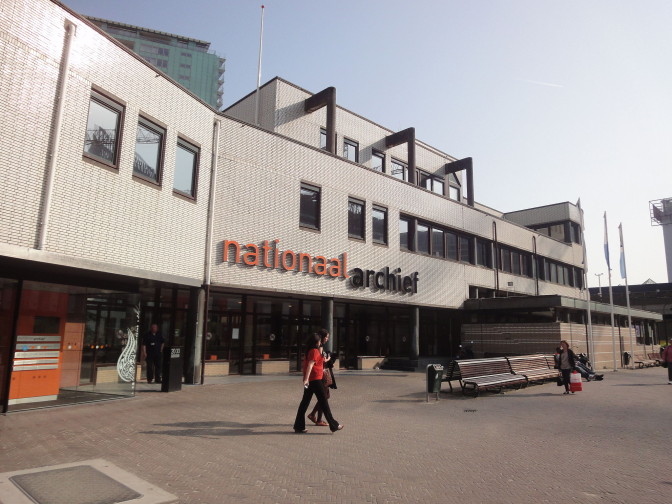To find records about your ancestors, it is useful to know how archives are organized; even if you’re looking for online records.
Government archives
The most important sources for genealogical research are kept in government archives. Churches were required to hand over their baptismal, marriage and burial registers when the civil registration was introduced (in 1811 in most parts of the country), so you can even find those records in government archives.
National Archives
At the national level, we have the Nationaal Archief, the National Archives of the Netherlands. They keep records of national importance, such as those of the Departments, of the Royal cabinet and of persons and organizations like the Dutch East India Company and the West India Company.

Nationaal Archief. Credits: Veertje1, Wikimedia Commons (CC-BY-SA)
Regional Archives
At the local level, we have the Regionale Historische Centra [Regional Historical Centers] or Gemeentearchieven [municipal archives]. These archives keep town records and records of local persons and organizations. The RHCs in the capital of the province also keep the records of the province. The National Archives also serves as the RHC of the province of Zuid-Holland.
What’s available online
Each of these archives have their own policies in what to make available online. All the RHCs in the provincial participate in WieWasWie to make their civil registration records available online, but many also choose to publish the information on their own website. On their websites, you will often find other types of sources, and the finding aids of their other holdings.
Visiting government archives
The Archiefwet [Archief law] allows everybody free access to government archives. You may visit the archives and consult the records without charge, and you may make photos or have reproductions made at your own expense. The website of the archive will have information about opening hours and whether or not they require you to make an appointment or reserve the records before your visit.
Some smaller archives do not have the budget or know-how to publish information online. You can only access these records by visiting the archives, often by appointment only. But all archives have many more records than what is available online.
The staff will help you to access the records, but they are not there as consultants or to do the research for you. If you do not speak Dutch, you will need to bring somebody along who does, and who can read the old handwriting. Sometimes, the archives provide research services for a fee.
Private archives
Besides government archives, there are also private archives. An example is the Koninklijk Huisarchief, the House Archives of the Royal family. They keep the personal records of the Royal family, while the official records are kept at the Nationaal Archief.
Another example is the Historisch Documentatiecentrum voor het Protestantisme [Historical Documentation Center for Protestantism] at the VU University in Amsterdam. They keep the records of many organizations and persons who were important in the history of the Protestant Church in the Netherlands. I consulted these archives for my research into Johan Frederik Kastein, a teacher who went to the Transvaal to teach and ended up as a POW in the Anglo-Boer War. He kept a diary and copy book of his letters while this was going on and his descendants donated these papers to the documentation center.
Private archives are outside the scope of the Archiefwet [archive law] so they can set their own rules for access. Many of them have websites where you can find their catalog or finding aids. In general, most of their information will not be available online but can only be accessed on-site, often by appointment only.
Links
- Nationaal Archief
- Map of archives in the Netherlands
- 10 tips for doing on-site research in the Netherlands


I am looking for anyone who is connected to a John or Martin Hoebe. My grandfather and greet grandfather. I think Martin was born in 186I he was married to Anne. John was born in 1898. Martin came to America with his family but returned to Holland. Nothing was ever heard from him.
You might try posting your question in the Dutch Genealogy Facebook Group. You will have a better chance of people seeing your query there than in the comments of a blog post about a different topic. You can also search WieWasWie to see if you can find his death record.